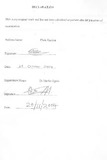| dc.description.abstract | The purpose of this study was to identify the change management practices employed by
the Multinational Oil Companies in Kenya. The study was to also identify the types of
resistance to change and the magnitude of resistance to change. All the respondents to the
questionnaire knew what change management is. Of the respondents 60% implement
planned change and 60% of the respondents implement emergent change. The rate of
change was predominantly strong and often bumpy incremental. In 80% of the respondents
change is dealt with in all departments, except for 20% in which change is driven by
human resources department. Change is predominantly internally driven and there is a low
rate of usage of external change experts. All the respondents do face resistance to change;
being primarily behavioural resistance and not systemic resistance. Resistance to change
results in delays in implementation, additional cost to achieve results, inefficiencies,
intentional sabotage, complaints and absenteeism. Inefficiencies are experienced to the
largest extent by the respondents, whilst absenteeism is experienced to the lowest extent. | en |

